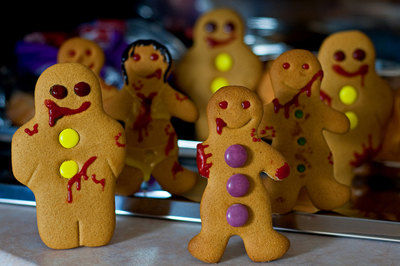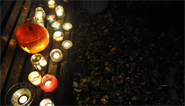 Night of the living bread
Night of the living bread
Zombies appear to be competing with vampires for popularity in horror films, TV series and computer games. Possibly, children disguised as zombies will knock on your door this Halloween. Both vampires and zombies are portrayed as mysterious members of a proliferating gang of predators against humanity. This may be true to legends about vampires but traditional zombies are quite different.
Zombie traditions originated in Haiti during the centuries of slavery. They are part of Vodou, a religion that fused elements of different African traditions with ideas and practices that suited the conditions of slavery. Vodou played a significant role in the Haitian Revolution (1791-1804) against French rule. The poverty that continues to haunt Haiti encourages the continuing popularity of Vodou and other religions that mix comfort with resistance and encouragement that things can be made better.
While some Vodou deities offered distraction from harsh reality, others encouraged slave revolts and liberation processes. They are a fascinating and boisterous crowd with varied preferences and predilections. Some remain more accessible than others. Some only talk through initiated and entranced priestesses or priests. Haitian musical and artistic cultures are heavily influenced by Vodou. Nonetheless, perhaps because of its support for revolution, Vodou has been demonised and oppressed. It is hardly surprising, then, that zombies have been misrepresented. Indeed, there is something sadly fitting about this. Haitians do not fear a zombie apocalypse because zombies are utterly controlled by those who have enslaved them. However, Haitians do fear becoming zombies just as their ancestors feared enslavement.
There are different theories about the nature of zombies. Most commonly it is thought that they are dead people whose corpses have been dug up, magically re-animated and forced to labour for merciless owners. Others claim that a potent brew causes victims to appear to die so that, after their untimely burial, they can be restored to a semblance of life and put to work. In either case, zombies are oppressed, their humanity is supressed and all their hopes and wishes are repressed. Some traditions say that if zombies eat a single grain of salt they will instantly understand their situation and become eager for revenge against their owners before returning to their graves. In short, zombies are so far gone that they cannot even desire liberation, but the only danger they pose is to their oppressors.
As at least some of those horror films show (even if they diverge from Vodou) we can learn something from zombie traditions. We can seek to liberate those who are enslaved today. We can resist zombification by challenging all that would make us passive, uncaring, disconnected, hopeless beings who trudge through mere existence obeying every whim of those who claim mastery. And we can seek, taste and share the salt of a more vibrant cultural and thoughtful life!
Finally, here’s a thought for Halloween: perhaps thinking about zombies might also remind us that this is (among other things) traditionally a festival for honouring those who have died. This is a good time to say thanks to past generations who have given us the opportunity to live now.






Rate and Review
Rate this article
Review this article
Log into OpenLearn to leave reviews and join in the conversation.
Article reviews
Before I was told that they're people like us who can't sleep or who don't sleep.
people or spirits??
I noticed some similarities between zombie films and vampire films, and wrote them up online.
In one genre of film, the elite are supreme and powerful and the 'normals' are weak and expendable. But am I talking about vampire films, where the vampires are strong and the masses are weak, or am I talking about zombie films, where the survivors are strong and the masses are weak?
Check it out on http://www.vexen.co.uk/zombies/vampires.html
Also the chemical purportedly involved in Haiti when Vodon priests make zombies is called tetrodoxin, which can cause paralysis to the extent that a dr could pronounce a person dead, when in fact they're not, and also cause mental confusion/damage.
Tetrodoxin can be extracted from a particular poisonous animal (frogs, if I recall correctly) which are local to Haiti. Although some researchers have written on tetrodoxin and zombies, most others remain unsure if it is really feasible, and articles by neurotoxin experts in The Skeptical Inquirer in 2013 quite thoroughly discredited the claims - especially the claim that such a poison can really be used effectively (i.e. dosage calculations have to be very, very specific for the victim's weight, etc, and even then effectiveness is unpredictable).
Anyway.... er...
Q. What do vegetarian zombies say?
A. Graaaaaaains.
Pfft ;p